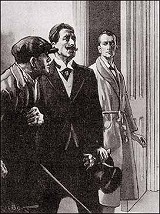
“No, I expect not,” said Holmes. “I think I can promise you that you will feel even less humorous as the evening advances. Now, look here, Count Sylvius. I’m a busy man and I can’t waste time. I’m going into that bedroom. Pray make yourselves quite at home in my absence. You can explain to your friend how the matter lies without the restraint of my presence. I shall try over the Hoffman ‘Barcarole’ upon my violin. In five minutes I shall return for your final answer. You quite grasp the alternative, do you not? Shall we take you, or shall we have the stone?”
Holmes withdrew, picking up his violin from the corner as he passed. A few moments later the long-drawn, wailing notes of that most haunting of tunes came faintly through the closed door of the bedroom.
“What is it, then?” asked Merton anxiously as his companion turned to him. “Does he know about the stone?”
“He knows a damned sight too much about it. I’m not sure that he doesn’t know all about it.”
“Good Lord!” The boxer’s sallow face turned a shade whiter.
“Ikey Sanders has split on us.”
“He has, has he? I’ll do him down a thick ’un for that if I swing for it.”
“That won’t help us much. We’ve got to make up our minds what to do.”
“Half a mo’,” said the boxer, looking suspiciously at the bedroom door. “He’s a leary cove that wants watching. I suppose he’s not listening?”
“How can he be listening with that music going?”
“That’s right. Maybe somebody’s behind a curtain. Too many curtains in this room.” As he looked round he suddenly saw for the first time the effigy in the window, and stood staring and pointing, too amazed for words.
“Tut! it’s only a dummy,” said the Count.
“A fake, is it? Well, strike me! Madame Tussaud ain’t in it. It’s the living spit of him, gown and all. But them curtains, Count!”
“Oh, confound the curtains! We are wasting our time, and there is none too much. He can lag us over this stone.”
“The deuce he can!”
“But he’ll let us slip if we only tell him where the swag is.”
“What! Give it up? Give up a hundred thousand quid?”
“It’s one or the other.”
Merton scratched his short-cropped pate.
“He’s alone in there. Let’s do him in. If his light were out we should have nothing to fear.”
The Count shook his head.
“He is armed and ready. If we shot him we could hardly get away in a place like this. Besides, it’s likely enough that the police know whatever evidence he has got. Hallo! What was that?”
There was a vague sound which seemed to come from the window. Both men sprang round, but all was quiet. Save for the one strange figure seated in the chair, the room was certainly empty.
“Something in the street,” said Merton. “Now look here, guv’nor, you’ve got the brains. Surely you can think a way out of it. If slugging is no use then it’s up to you.”
“I’ve fooled better men than he,” the Count answered. “The stone is here in my secret pocket. I take no chances leaving it about. It can be out of England to-night and cut into four pieces in Amsterdam before Sunday. He knows nothing of Van Seddar.”
“I thought Van Seddar was going next week.”
“He was. But now he must get off by the next boat. One or other of us must slip round with the stone to Lime Street and tell him.”
“But the false bottom ain’t ready.”
“Well, he must take it as it is and chance it. There’s not a moment to lose.” Again, with the sense of danger which becomes an instinct with the sportsman, he paused and looked hard at the window. Yes, it was surely from the street that the faint sound had come.